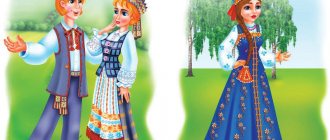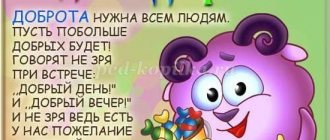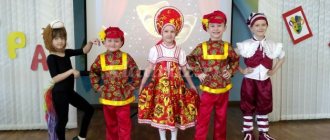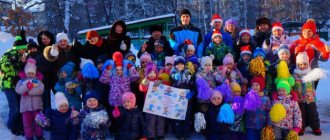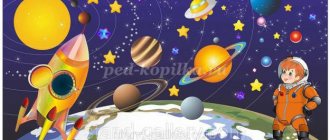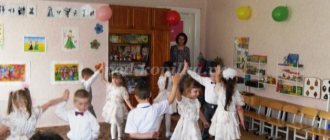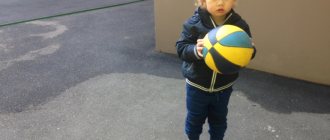National Unity Day in kindergarten. Preparatory group. Scenario
Matinee in honor of National Unity Day for children of the preparatory group “We are strong through our friendship and proud of our Motherland”
Author: Elena Nikolaevna Salikhova, music director of the Sevastopol State Budget Educational Institution “Kindergarten No. 89 of the compensating type.” About the event: National Unity Day is a relatively young national holiday, although it has roots that go quite far into the historical past of our state. The importance of this holiday is not questioned by anyone for whom the integrity of our country and the well-being of all peoples living on its territory is not an empty phrase. We considered that holding an event dedicated to National Unity Day in our preschool institution could become an important contribution to the patriotic education of preschool children. At the same time, it was necessary to correctly place the emphasis and select material that was accessible to the age of our students. Therefore, the script was not based on historical events, although the children were introduced to them in an accessible form during the preliminary work, but on such concepts as “friendship”, “mutual assistance”, “united Motherland”, “Russian language”. The scenario may be of interest to music directors, educators, primary school teachers, and teacher organizers. The purpose of the holiday: to educate preschoolers to love our united Motherland - Russia! Objectives Educational:
to form in older preschoolers an understanding of belonging to the Russian people and Russia as the single Motherland of all people living on its territory.
Arouse interest in the historical past and cultural heritage of our country. Developmental:
create conditions for the active participation and artistic expression of children in the joyful atmosphere of a national holiday.
Educational:
cultivate respect for the flag of the Russian Federation.
Continue to form feelings of friendship and mutual assistance as the basis of fraternal relations between all people inhabiting our country. Preliminary work: listening and learning songs about Russia, about friendship. Learning Russian folk songs, dances, games and round dances; dance composition "United Russia". Conducting discussions on the content of the works being learned. Introduction to Russian folk instruments and their sounds; learning different ways to play them. Introduction to Khokhloma painting. Attributes: Multi-colored “Pavloposad” scarves for a dance composition. Swords, shields and helmets for the “Bogatyrs”. Wooden spoons - two for each child, two rattles, a whistle. For the “United Russia” composition: medium-sized flags for boys and artificial bouquets of autumn flowers for girls. Gingerbread cookies for treating children.
Progress of the holiday The presenter enters the festively decorated hall. Presenter: Hello, dear guests. Today we want to celebrate with you one of the most important holidays of our country - National Unity Day. The soundtrack of the Russian folk song “There was a birch in the field” performed by the orchestra of the State Choreographic Ensemble “Beryozka” is played. Presenter: A familiar melody flows from heart to heart. Let the guys come in here and let our holiday begin. Children in Russian folk costumes enter the hall to the music in two streams and stand in a semicircle. Song “Russian Side”, music and lyrics by S. Kozhukhovskaya
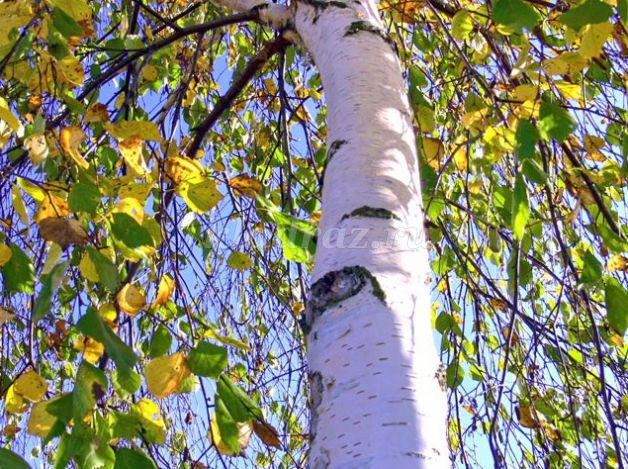
Children: We all call the land where we live together as Motherland; a white-trunked birch tree outside the kindergarten window. We all call everything we love and cherish as Motherland: our songs, our fairy tales, our beloved city, home. We all call the flag that flies over the Kremlin the Motherland, our people of a great country: friendly, many-sided. Presenter: Different peoples have lived in Russia for a long time. Some like the taiga, others like the expanse of the steppe. Each nation has its own language and dress. But together all peoples speak Russian. After all, Russians, Tatars, Bashkirs and Yakuts live as one family in Russia.
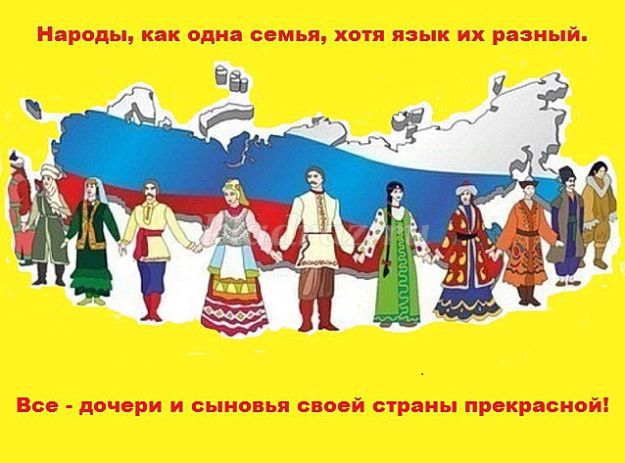
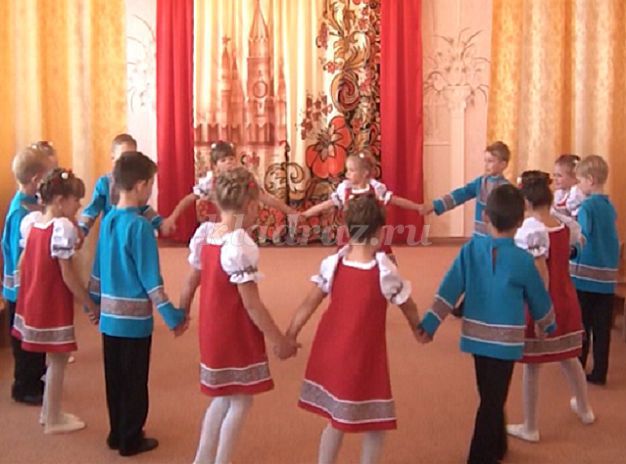
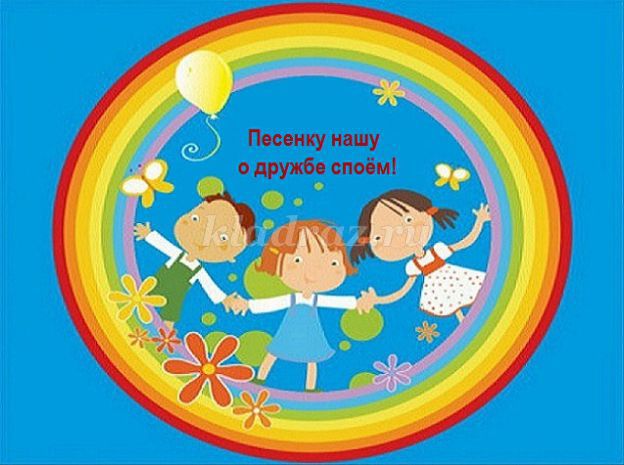
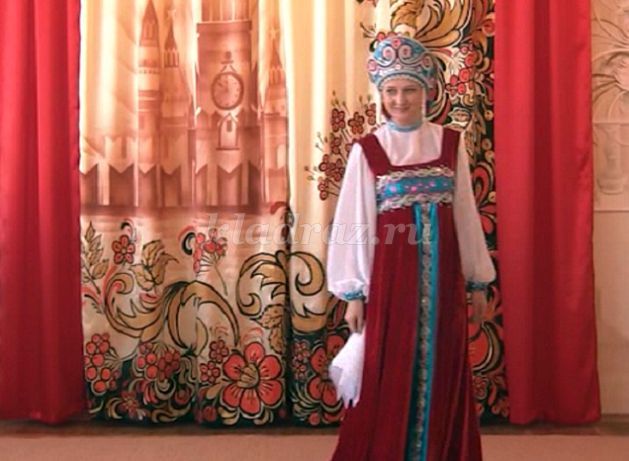
Vasilisa the Wise: Russia! Rus! Take care of yourself! Keep it! Live long, country, united power! Let the fires of the Fatherland burn! Let your glory not fade away! In all centuries, Russian people defended their land from those who wanted to take it away. They taught their children to selflessly love their Motherland. Child: We know that every Russian is happy to stand up for his country, just like Pozharsky and Minin were many years ago.
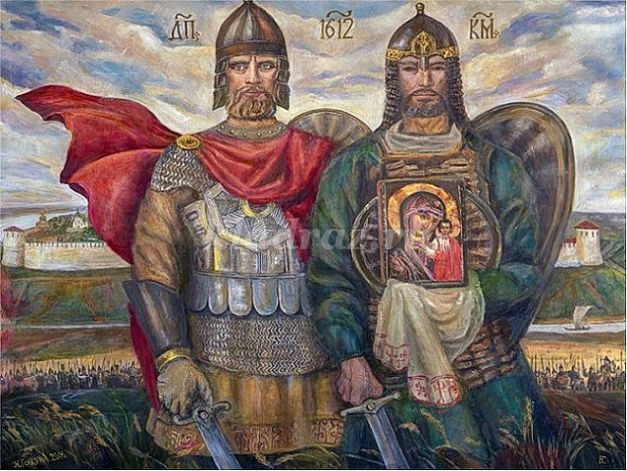
To the music, the “Three Bogatyrs” come out in turn to the words of the presenter. Here comes a young hero coming to us. He will grow up and stand up for his homeland. And another hero is trying to become his friend. He tries to be useful for the Fatherland. And here the third hero is in a hurry. His conscience does not tell him to sleep on the stove.
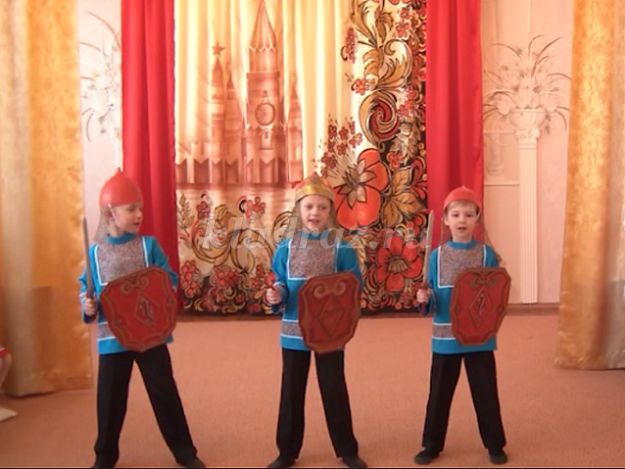
Bogatyrs: The helmet is on my head. I hold a shield and a sword in my hand. Today I turned into a Russian hero! I know that only a good warrior is worthy of being a hero. You need to be strong and strong in order to protect the weak. I don’t cry from scratches and I’m not afraid of vaccinations. And it cannot be otherwise. I am proud of the title “Bogatyr”! The three of us perform the “Heroic Song”: We will not be at a loss before the dark force. At least we don’t boast (raise the sword)
of our strength
(lower the sword)
.
We will not be afraid
of the Nightingale - the Robber (lunge forward) (starting position)
.
Beware, uninvited guest, Bogatyrs (take a step forward)
.
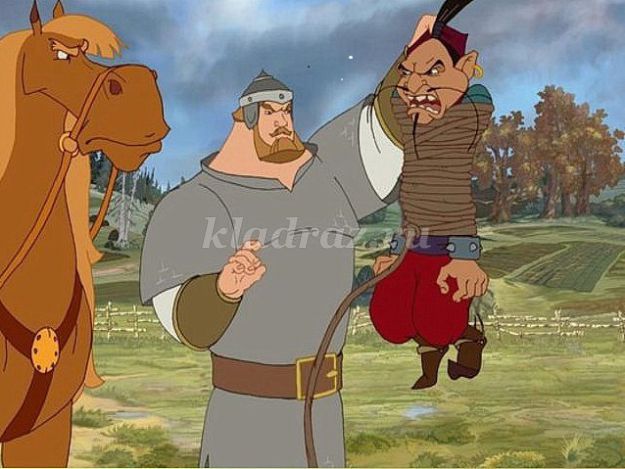
The middle hero takes a step forward, the other two take an additional step towards each other. To the soundtrack of the Don Cossacks' drill song "From Behind the Forest, a Copy of Swords" performed by the Cossack Circle ensemble, they walk around the hall and go behind the side curtains: Oh, from behind the forest, behind the forest, a copy of swords. A hundred Cossacks are riding - reckless drivers, Hey-hey-hey, quickly, don’t be timid! A hundred reckless Cossacks are riding. Oh, in front of a hundred esaul, oh, young. He commanded: “Guys, everyone follow me!” Hey-hey-hey, quickly, don’t be shy! He commanded: “Guys, everyone follow me!” ...
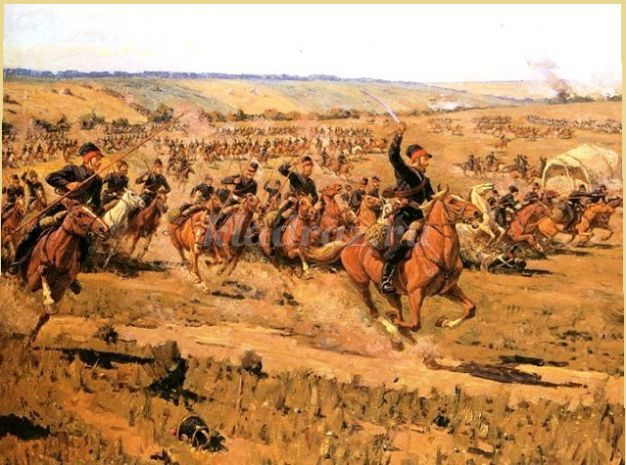
Vasilisa the Wise: I wish good luck to our “Three Heroes”. Let them grow and not cry, to the joy of mothers and all of us. The boys playing the roles of the Bogatyrs come out, bow, and sit down. Vasilisa the Wise: And here are the red ones - the girls are coming, they will sing a Russian song. The girls perform the “Russian folk song “From the yard, from the yard”, dance: From the yard, from the yard, (small side steps to the right - left), from the wide yard (spread their arms to the sides), A clear falcon flew out, took the gold bridle. He took the gold bridle (right hand clenched into a fist - forward). He saddled the good horse (with his left hand clenched into a fist - forward).
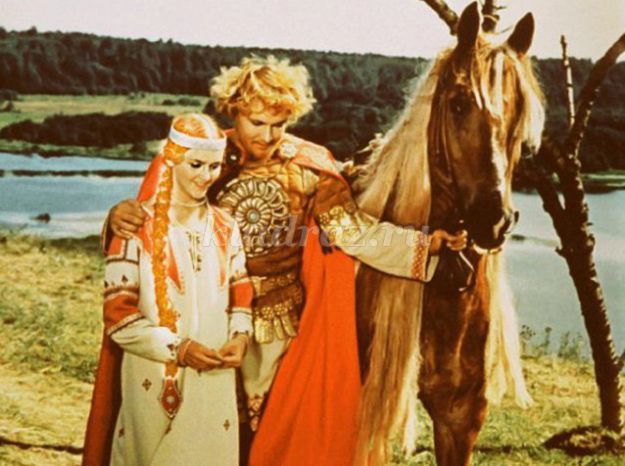
Saddle the faithful horse (perform springy movements with the legs). Gathered faithful friends! Gathered faithful friends! Gathered into a squad (hold hands). He gathered into a squad (they let go of their hands). Rus' - Protected Mother (raise hands to chest, bow, leave). Vasilisa the Wise: On this wonderful holiday, I want to wish our “fine maidens and good fellows” to grow up as beautiful, healthy, happy people, to live joyfully and in harmony, and to love their Motherland. I also want to give you this bright colorful scarf as a gift (Gives the scarf to the first presenter)
.
I myself will leave now, I will invite new guests to you. Leaves. Presenter (looking at the scarf):
What a beautiful Pavloposad scarf Vasilisa the Wise gave us! The country of Russia is great, and our people are talented. Rumors spread all over the world about Russian craftsmen and craftsmen.
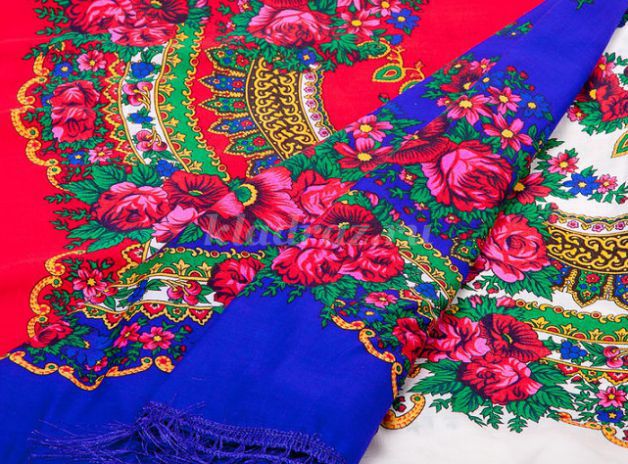
It’s as if the colors of the inflorescences started their dance. Like wings, the arms opened in a dance, beckoning the world with a picturesque pattern. They soared over free Russia, giving it the colors of rich beauty. A group of girls performs a dance with Russian scarves, learned in a choreographic circle.
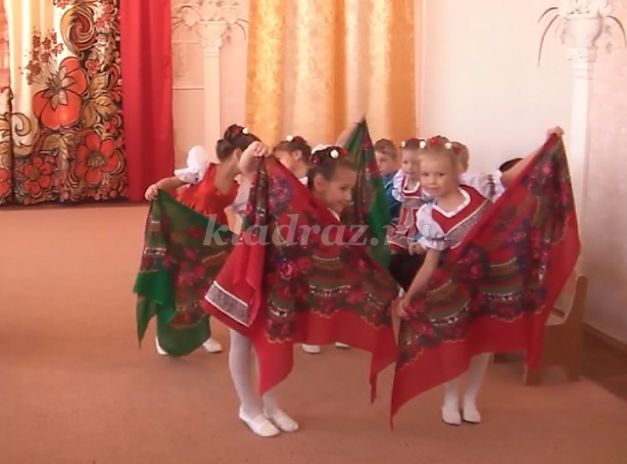
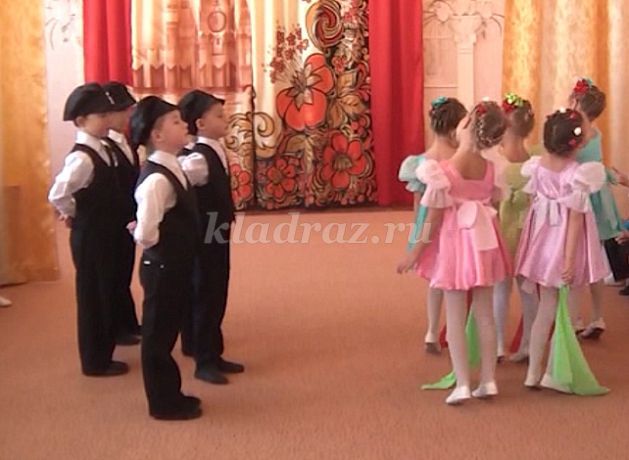
Presenter: I see that new guests are rushing to us to please the guys. Matryoshka and Ermoshka enter to the soundtrack of the Russian folk melody “Polyanka”. They dance, Ermoshka plays along on the whistle.
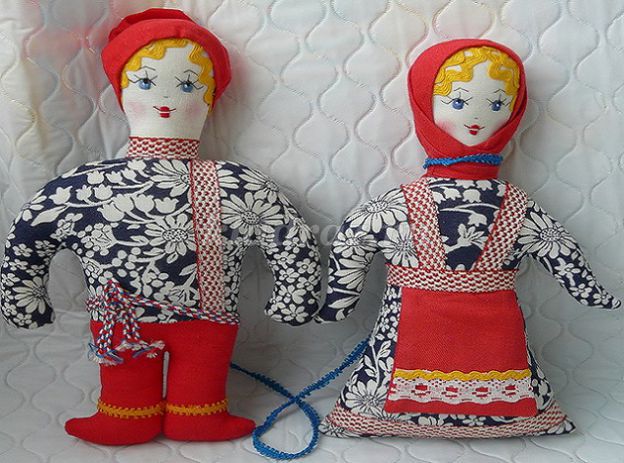
Sketch Matryoshka and Ermoshka. Matryoshka: Hello, guys! Ermoshka: Hello, dear adults! Presenter: Hello, dear guests. You are so smart. Ermoshka: We were getting ready for the holiday, so we tried to get dressed. Matryoshka: I brought Ermoshka to you. Ermoshka: No, I brought Matryoshka. Matryoshka: In general, we came together. They brought you riddles. Ermoshka: I know, I know in advance, you are a savvy people. So guess what. What a cure for oak plank melancholy. He doesn't play, but chatters, and that's what makes everyone happy. (Ratchet)
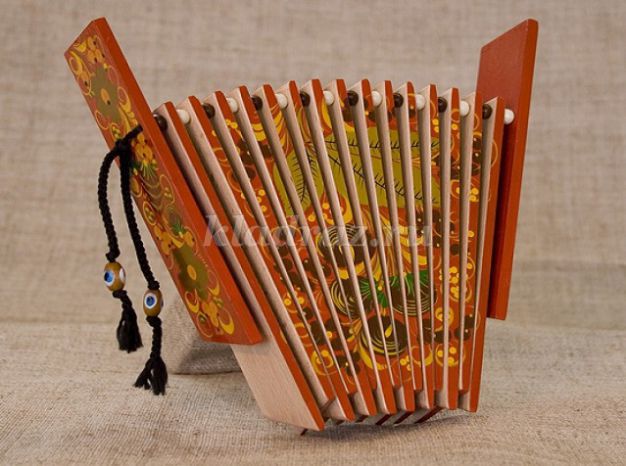
Matryoshka: My riddle is more complicated. She feeds everyone willingly, but she herself is mouthless. I’ll scoop up the potatoes and feed Ermoshka. If you want, slurp soup with it, or if you want, play music. (Wooden spoon) Presenter: We also have carved spoons. Voiced, painted! Our spoon players would play from dawn to dusk.
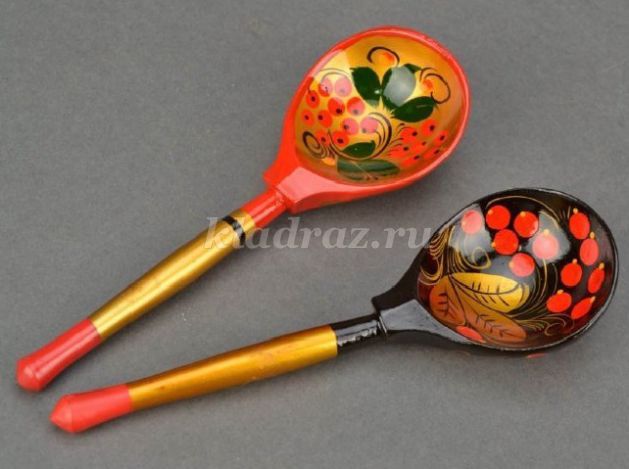
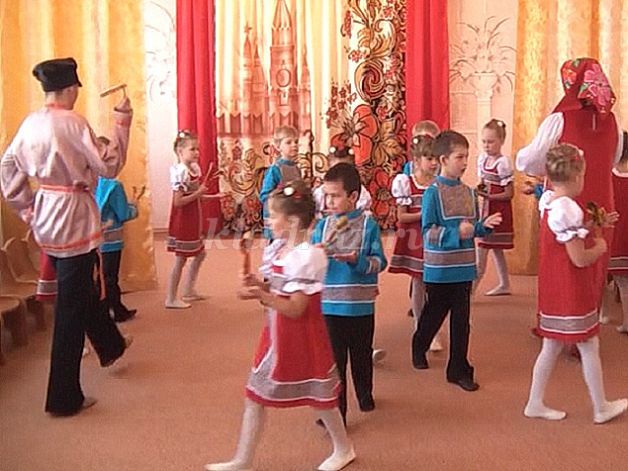
Matryoshka: And now, kids, it’s time to amuse you. Ermoshka: We love the game “Wicket”. We could play it all day. Matryoshka: We’ll assemble our “Wattage” quickly! Ermoshka: We'll see. Whoever is friendlier will be faster! The game “Wattage” is played using phonograms of Russian folk melodies “From under the oak, from under the elm” and “Komarochki”. Presenter: Matryoshka’s wattle fence is good, and Ermoshka’s is also good. Ermoshka: We played together and had fun, so we weren’t late. I will be happy to treat such friendly guys. Matryoshka: And what we have prepared for the treat, we ask you to guess: not cake or cookies, not sweets, not jam... Ermoshka: Sweet, honey, tasty and mint. A noble treat for aromatic tea. What is this? Children: Gingerbread. Matryoshka: Correct. Take the treat. Ermoshka: Don’t forget about us.
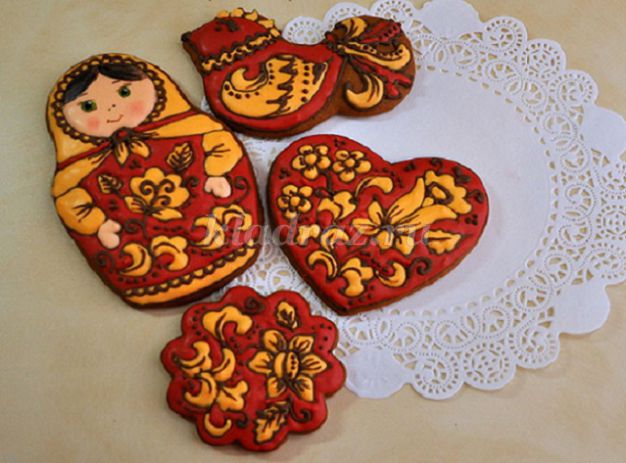
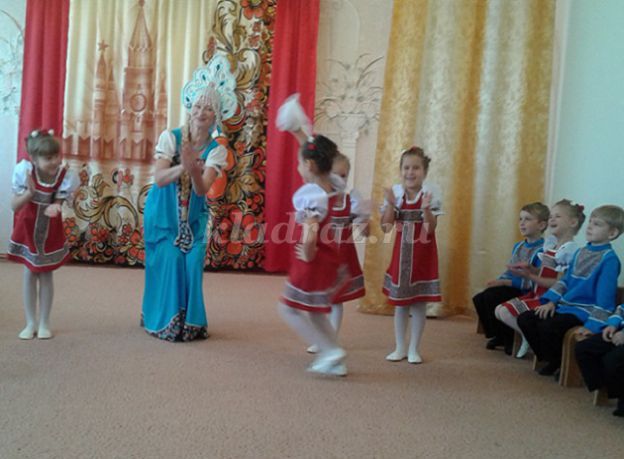
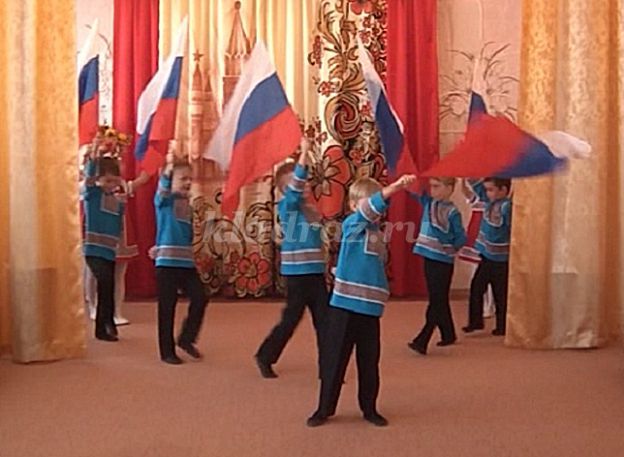
Golden-domed Russia!
Generous spring land! Bloom under the blue sky! Spread your wings proudly! I can’t imagine myself without Russia, without its birches and poplars. Without her irresistible force! Without her love and without mine! Children: We are strong with our friendship and proud of our Motherland! To the solemn “Song of Russia,” first the children, and then the adults, bow and leave.
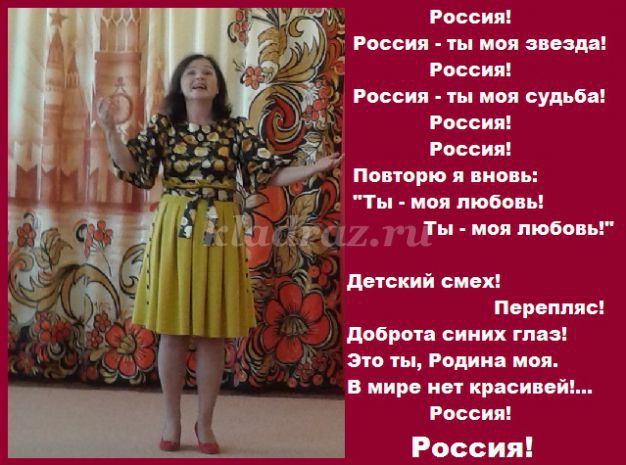
We recommend watching:
Sports festival for different age groups in kindergarten. Day of National Unity Day of National Unity in the senior group of kindergarten. Scenario Summary of educational activities in the senior group of kindergarten on the topic: National Unity Day Celebration with parents in kindergarten on National Unity Day
Similar articles:
National Unity Day in kindergarten and senior group
Conversation on the topic of National Unity Day lesson plan (preparatory group) on the topic
Summary of continuous directly organized educational activities (DED) in the senior group
"Day of National Unity".
Main educational area: “Cognitive development”.
Integration of educational areas: social and communicative development, speech development, physical development.
Types of children's activities: communicative, cognitive and research.
Goal: education of a humane, spiritual and moral personality, worthy future citizens of Russia, patriots of their Fatherland.
Objectives: - to consolidate the idea that our country is huge, multinational, called the Russian Federation, Russia;
— consolidate knowledge about the geographical location of the country on the map;
— expand the understanding of public holidays, the holiday “National Unity Day”, the meaning and history of its origin;
— provide basic information about the history of Russia;
— to develop knowledge about the multinationality of our country;
— consolidate knowledge about the flag, coat of arms and anthem of Russia;
— cultivate respect for other peoples and cultures;
- develop auditory attention and memory.
Equipment and materials: sheets of paper according to the number of children, projector, laptop, magnetic board, presentation “National Unity Day”, audio recording of the Russian anthem, flag and coat of arms of Russia.
GCD move:
Org. moment:
Educator: - I won’t get tired of enjoying the lark’s song, I won’t exchange the sweet side for anything! The warm wind will bring the aroma of currants, So what is more expensive? - There is nothing more expensive... (Motherland)
- A person has one natural mother, and he has one homeland. Her people love her deeply. What is the Motherland?
Homeland.
Motherland is a big, big word! Let there be no miracles in the world, If you say this word with your soul, It’s deeper than the seas, higher than the skies! Exactly half the world fits in it: Mom and dad, neighbors, friends, Hometown, hometown, hometown, hometown, school, kitten... and me. A sunny bunny in my palm, a lilac bush outside the window and a mole on my cheek - This is also the Motherland.
(author Tatyana Bokova)
- What is the name of our Motherland? (Russia)
Basic GCD part:
View the presentation “National Unity Day”.
Educator: - There are many different beautiful countries in the world and every people loves their homeland most of all. You and I were born in Russia, we are Russians. - Do you love your country? (children's answers) And for what? (children give their own answers, some find it difficult to answer the question).
Educator: - Who can answer this question? Citizens of a country feel love for their homeland simply because they live in it. After all, we all have one homeland. Our Motherland is very large, beautiful and rich. Russia occupies the largest and most extensive territory from Europe to Asia. Only in our country there is the polar zone, and the tundra, and the taiga, and the steppe, and the tropics. (Look at the map).
Educator: - Do only Russians live in Russia? (No)
— What peoples inhabit our country? (children's answers)
Educator: - Yes, our country is inhabited by people of different nationalities - Ukrainians, Belarusians, Tatars, Karelians, Chuvash, Bashkirs, Yakuts, Dagestanis, Adygeis, Mordovians, Komi, Udmurts, Khanty, Mansi, Germans, Tajiks, Armenians, Azerbaijanis, Georgians, Shors and many, many others - in total more than a hundred nationalities.
Educator: - Which nationality do you think is better? (children's answers)
— Different peoples inhabit Russia, but they are all united into a single family by a common Motherland, mutual respect and friendship. Therefore, it is impossible to say which nationality is better - we are all equal, all special.
Phys. just a minute:
In our country the mountains are high, (hands up, on tiptoes)
The rivers are deep (crouched down),
The steppes are wide (arms to the sides),
The forests are large (we draw a circle with our hands),
And we are guys like that! (thumbs up)
Educator: - On November 4, all of Russia will be about. This is a holiday of patriotism, mutual assistance and unity of all Russian peoples.
— Guys, how do you understand what unity is? (Unity is when all people are together)
Experiment: one child is asked to tear a stack of paper in half (the child cannot tear the paper), then each child is asked to tear one sheet of paper into two parts. The teacher draws an analogy: when we are all together, friendly and united, we cannot be defeated, but if we are alone, like one piece of paper, then it will be easy to defeat us.
—Who are patriots? (These are people who love their Motherland and are always ready to defend it)
— The National Unity Day holiday has a very ancient history. Listen to her. It all started 400 years ago, in the 17th century. Then a terrible time began in Rus', which was called the Troubles (everything was mixed up, nothing could be understood). There was no king in the country, the laws were not respected. The Poles took advantage of this. They attacked our country. They captured Moscow and the main fortress of the capital - the Kremlin. It was difficult for the residents of Moscow; the invaders destroyed their houses and desecrated their churches. But there were brave people - Kuzma Minin and Dmitry Pozharsky. They gathered an army, prayed to the Heavenly Intercessor icon of the Most Holy Theotokos and went to liberate the capital of Russia - Moscow and the main fortress - the Kremlin.
Russian soldiers fought for two months and on November 4 defeated the enemy and drove him out of the Kremlin. Rus' again became autocratic, that is, independent. In Moscow, on Red Square, in honor of the victory over the Poles, a bronze monument to Minin and Pozharsky was erected so that people would not forget and honor the heroes of their country. It is in honor of this event that “National Unity Day” is celebrated.
Russia did not immediately become a strong state; the country's power gradually increased. In severe trials and battles, the will was tempered, and the unity of the people was strengthened.
400 years have passed, during which time different countries tried many times to conquer Russia, but they failed, all people stood up to defend their country. (The story is accompanied by a display of illustrations from the presentation)
Educator:
- Guys, let's check which of you is the real citizen of our country? (Listening to an audio recording of the Russian anthem while standing)
— Tell me, please, what is the name of this music? (Anthem) That's right - this anthem is the main musical work of our country. It is performed on the most solemn occasions and all people stand as a sign of respect and pride for their country.
— Every Russian knows and respects the main symbols of his country - the anthem, coat of arms and flag. We have already heard the anthem. Here in front of us is the coat of arms of Russia. What is depicted on our coat of arms? (children's answers).
- Please note that on our coat of arms the eagle has two heads, which means that it will not allow a single enemy to pass through. In the paws of the eagle are symbols of power - a scepter and an orb, such as the Russian tsars had in the old days.
- And this is our flag. Guys, list what colors it consists of (they are called). The white stripe - a symbol of purity of intentions and nobility - means that our state has no evil intentions, it treats all countries honestly and openly. The blue stripe, a symbol of peace, indicates that Russia is against war. The red stripe - a symbol of courage - means that every citizen of Russia is ready to defend the freedom and honor of the Motherland from enemies.
Result: - Well done guys, you know a lot about our homeland Russia. Today you learned more about the holiday “Day of National Unity”, about our Motherland - Russia, about the state symbols of the Russian state. I hope that you will always love and be proud of our Motherland and when you grow up, glorify it with your deeds. Russia will always be proud of you.
